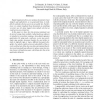Free Online Productivity Tools
i2Speak
i2Symbol
i2OCR
iTex2Img
iWeb2Print
iWeb2Shot
i2Type
iPdf2Split
iPdf2Merge
i2Bopomofo
i2Arabic
i2Style
i2Image
i2PDF
iLatex2Rtf
Sci2ools
104
Voted
ACSAC
2003
IEEE
2003
IEEE
How to unwittingly sign non-repudiable documents with Java applications
Digital signatures allow us to produce documents whose integrity and authenticity, as we generated them, is verifiable by anybody who has access to our public key. Furthermore, we cannot repudiate those documents as something we never saw, let alone signed, since nobody else but us could access our private key. In this paper we show how the previous statement can be proved wrong when carefully crafted malicious software is installed on a machine running a Java digital signature application. By using such a software, a user may unwittingly sign another document besides the one he/she intends to digitally sign or sign a different document altogether. Our attack exploits a known vulnerability of the security architecture of the Java run-time environment that allows non-Java malicious software to replace some Java system classes with malicious ones, which then alter the victim application behavior.
| Added | 04 Jul 2010 |
| Updated | 04 Jul 2010 |
| Type | Conference |
| Year | 2003 |
| Where | ACSAC |
| Authors | Danilo Bruschi, D. Fabris, V. Glave, Emilia Rosti |
Comments (0)

